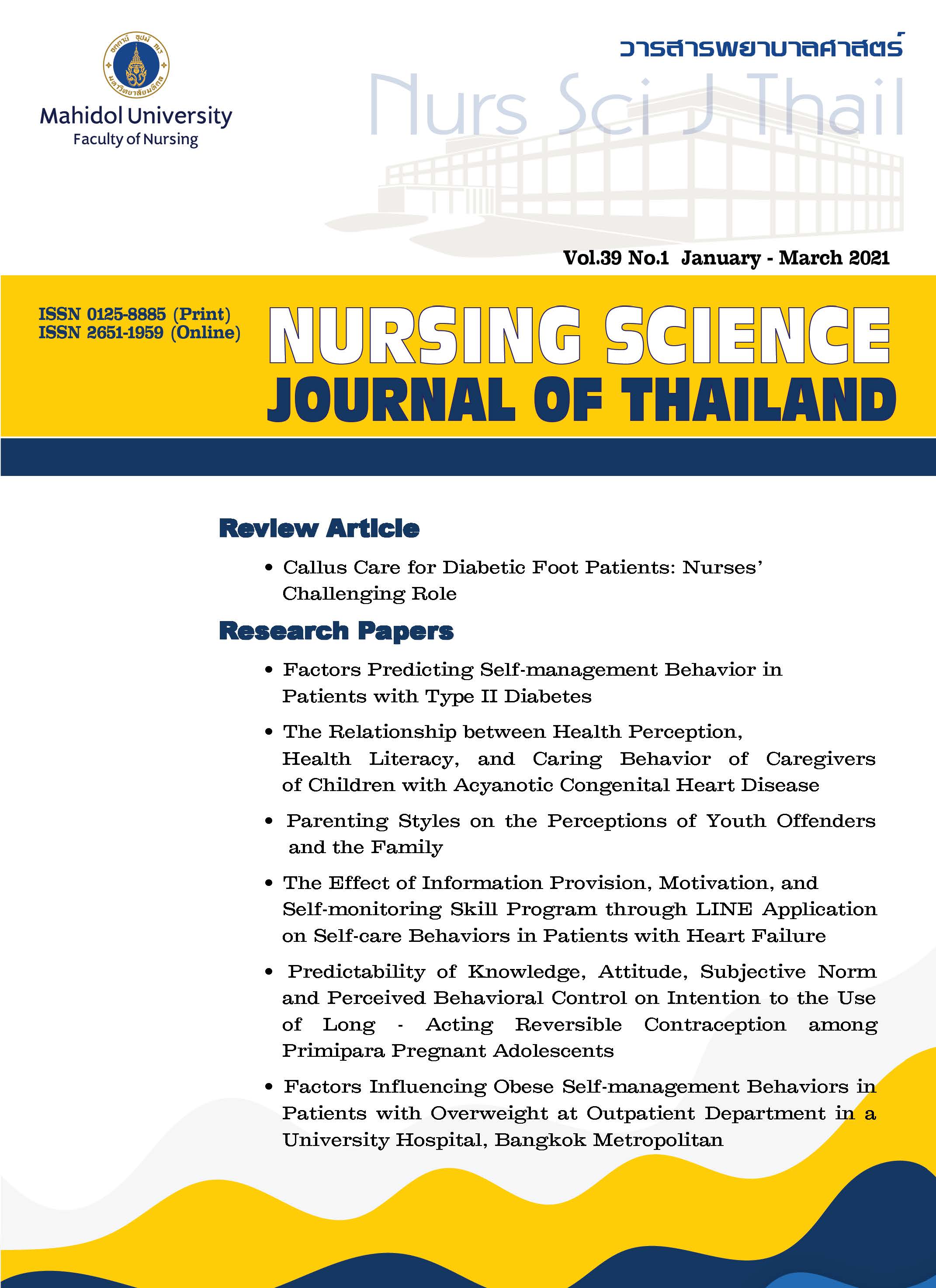Factors Predicting Self-management Behavior in Patients with Type II Diabetes
Main Article Content
Abstract
Purpose: The research aimed to investigate factors predicting self-management in Patients with Type II Diabetes. The study factors included self-efficacy, health perception, patient-provider communication and stage of change for behaviors.
Design: Correlational predictive design.
Methods: The study sample consisted of 144 patients with type II diabetes without any other complications at NCD clinic and outpatient departments from two community hospitals. A convenience sampling was used for the recruitment. Data were collected using a set of questionnaires including demographic information, health perception, self-efficacy, patient-provider communication, stage of change for behaviors, and self-management questionnaires. Descriptive statistics and multiple regression analysis were used for data analysis.
Main findings: The findings showed that an average age of patients with type II diabetes was 62.49 years (SD = 10.91) and their average years of disease duration was 9.03 years. The scores of self-management behavior ( = 85.67, SD = 10.71), health perception (
= 67.41, SD = 5.23), self-efficacy (
= 201.79, SD = 30.45), patient-provider communication (
= 85.71, SD = 6.63) and stage of change for behaviors (
= 25.71, SD = 3.40) were at high level. The stage of change for behaviors is the only predictor of self-management behaviors in patients with type II diabetes (β = .69, t = 10.69, p < .01); while 53% of the variation in self-management behaviors could be explained by the set of study variables (adjusted R2 = .53)
Conclusion and recommendations: The level stage of change for behavior influences self-management behaviors of patients with type II diabetes. Therefore, nurses and health personnel should assess the readiness for behavior change. Then assistance that is tailored to their readiness for behavior change should be provided so that they would be able to establish and maintain self-management behavior appropriately and continuously.
Article Details
Copyright Notice: Nursing Science Journal of Thailand has exclusive rights to publish and distribute the manuscript and all contents therein. Without the journal’s permission, the dissemination of the manuscript in another journal or online, and the reproduction of the manuscript for non-educational purpose are prohibited.

Disclaimer: The opinion expressed and figures provided in this journal, NSJT, are the sole responsibility of the authors. The editorial board bears no responsibility in this regard.
References
American Diabetes Association. Classification and diagnosis of diabetes. Diabetes Care. 2017;40 Suppl 1:S11-S24. doi: 10.2337/dc17-S005.
Division of Non Communicable Diseases, Department of Disease Control, Ministry of Public Health. Situation of non-communicable disease 2016-2018 [Internet]. Nonthaburi: Division of Non Communicable Diseases; 2019 [cited 2020 Jun 10]. Available from: http://www.thaincd.com/2016/mission/documents-detail.php?id=13653&tid=32&gid=1-020. (in Thai).
Creer TL. Self-management of chronic illness. In: Boekaerts M, Printrich PR, Zeidner M, editors. Handbook of self-regulation. San Diego, CA: Academic Press; 2000. p.601-29.
American Diabetes Association. 3. Prevention or delay of type 2 diabetes: standards of medical care in diabetes--2020. Diabetes Care. 2020;43 Suppl 1:S32-6. doi: 10.2337/dc20-S003.
Phetarvut S, Watthayu N, Suwonnaroop N. Factors predicting diabetes self-management behavior among patients with diabetes mellitus type 2. Journal of Nursing Science. 2011;29(4):18-26. (in Thai).
Gunggu A, Thon CC, Lian CW. Predictors of diabetes self-management among type 2 diabetes patients. J Diabetes Res. 2016;2016:9158943. doi: 10.1155/2016/9158943.
Mishali M, Omer H, Heymann AD. The impact of measuring self-efficacy in patients with diabetes. Fam Pract. 2011;28(1):82-7. doi: 10.1093/fampra/cmq086.
Boontein P, Saneha C. Factors predicting metabolic self-management behavior among patients with metabolic syndrome at one university hospital in Bangkok. Journal of Nursing Science. 2017;35(3):70-81. (in Thai).
Prochaska JO, Velicer WF. The transtheoretical model of health behavior change. Am J Health Promot. 1997;12(1):38-48. doi: 10.4278/0890-1171-12.1.38.
Arafat Y, Mohamed Ibrahim MI, Awaisu A, Colagiuri S, Owusu Y, Morisky DE, et al. Using the trans theoretical model's stages of change to predict medication adherence in patients with type 2 diabetes mellitus in a primary health care setting. Daru. 2019;27(1):91-9. doi: 10.1007/s40199-019-00246-7.
Tseng H-M, Liao S-F, Wen Y-P, Chuang Y-J. Stages of change concept of the trans theoretical model for healthy eating links health literacy and diabetes knowledge to glycemic control in people with type 2 diabetes. Prim Care Diabetes. 2017;11(1):29-36. doi: 10.1016/j.pcd.2016.08.005.
Wattanakul B. Factor influencing diabetes self-management behaviors among patients with T2DM in rural Thailand [dissertation]. Chicaco, IL: Illinois University; 2012. 141 p.
Rojpaisarnkit K. Development of health perception scales for Thai adults [dissertation]. Bangkok: Mahidol University; 2001. 239 p. (in Thai).
Sirikutjatuporn K, Wirojratana V, Jitramontree N. Factors predicting self-management behaviour of elderly type 2 diabetes patients. Thai Journal of Nursing Council. 2017;32(1):81-93. (in Thai).
Bandura A. Self-efficacy: the exercise of control. New York: W.H. Freeman and Company; 1997. 604 p.


